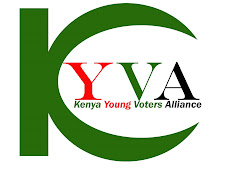KYVA is a conglomerate of organizations and individuals committed to ensuring that Kenya as a country manages to achieve set developmental goals to meet both the international and national targets. The idea was mooted by the (SONU) leadership of 2003/4. KYVA leadership is composed of diverse backgrounds and experiences. We urge all Kenyan youths to take charge of leadership at the counties and national levels. Register as voters and vote in large numbers for young visionary leaders.
Monday, April 19, 2010
THE ELECTORATE MUST NOT BE FED ON A PLETHORA OF INFAMOUS FALSEHOODS ON THE DRAFT CONSTITUTION.
Whereas we acknowledge the fact that the obstacles to consensus on the draft constitution are considerable, I wish to appeal to the political class and a section of the clergy to ensure that the campaigns for or against the draft constitution must be issue based. Of particular concern is the fact that they are saying things that are not only grossly misleading but utterly irresponsible as well.
First, the draft opponents opine that in the absence of Majimbo, the draft constitution completely fails on the devolution front. What they however fail to tell the public is that the moment every legislator demanded to have a region in his backyard, the import of devolution as envisaged in article six of the draft constitution was lost. Aware that we could not sit down with a square rule and compass to re-design our ethnic boundaries, the regional architects engaged in shady alliances and disgraceful back-room deals in Naivasha with a view to blocking and thwarting the interests of politicians from smaller regions from ascending to the highest political office of this country. However, back in parliament it emerged that no conscientious legislator wanted to be part of a cabal that desired an amendment for the formation of permanent regional majoritarian.
Secondly, the no campaign is saying that the president in the draft constitution is akin to a quasi king. This of course, is another white lie. It is important to note that unlike the current constitution that makes a mockery of the separation of powers with little if any checks and balances; the draft constitution has vested distinct power in the three arms of the government. It also has in built checks and balances effectively designed to limit on the president and by extension, the government`s abuses. The draft constitution empowers parliament to vet the president`s appointees. For instance in article 205, clause one, the state president on the recommendation of the Judicial Service Commission and with the approval of the National Assembly, shall appoint the Chief Justice, the Deputy Chief Justice and other Judges. In extreme circumstances, parliament can, with a two thirds majority, impeach a sitting president without shooting itself in the foot as is the case in the current constitution. We also have the senate which can check the excesses of not only the president but of parliament as well thereby further limiting on the abuses of the president.
Thirdly, with regard to article thirty five, clauses one and two, abortion is only permitted to the extent that in the opinion of a health professional, the mother`s health is in grave danger. This views are also contained in sections 158, 159 and 160 of Kenya`s penal code. Like the draft constitution, section 240 of the penal code provides an exception. It states that a person will not be criminally responsible for performing in good faith and with reasonable care and skill a surgical operation upon an unborn child for the preservation of the mother`s life, if the performance of the operation is reasonable, having regard to the patient`s state at the time, and to all circumstances of the case. Interestingly, this section of the penal code has never caused uproar among the clergy. It must be said without any fear of contradiction that the flock is irked by the devout clergy that has deliberately or otherwise chosen to misunderstand the divine linkage between Christianity and science.
On land, article fifty nine, clauses one and two spell out the right to an individual to own property and that the state shall not arbitrarily deprive a person of property of any description nor will the state through parliament’s legislation limit or in any way restrict the enjoyment of any right under this article as it will obviously be negating the article on freedom from discrimination as is contained in article thirty seven, clause one of the same draft constitution. However, in clause three, such an exceptional action is permissible in so far as it is strictly done in the interest of the public.
It must be noted that it is the practice all over the world for the states to at times invoke the power of eminent domain to foster economic productivity. Based on our history of injustices, it must be made clear that the power of eminent domain can only be invoked on legally acquired property. This is where the National Land Commission (NLC) comes in. Before adequate compensation, NLC will look into whether the land in question was legally acquired or not and make appropriate recommendations to the Government.
It is also quite in order for the government to introduce tax on unused but legally acquired lands with a view to encouraging production on such lands. Again, this is purely in the interest of the public. The argument by the “no” proponents that the government will arbitrarily deprive people of their land is therefore baseless.
Finally, Kadhi courts are not in anyway contentious since they do not infringe upon the constitutional rights of the Christians. In any case, true Christians know that equality is in the eyes of God, not the earthly constitution.
Clearly, the challenge seems to be how the “yes” proponents can carry out effective civic education given the propensity for the electorate to swallow with ease plethora of infamous falsehoods and distortions.
TOME FRANCIS,
BUMULA.
http://twitter.com/tomefrancis
Subscribe to:
Post Comments (Atom)

No comments:
Post a Comment